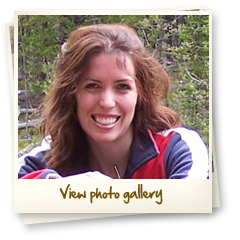

My name is Yvonne Martin and I am an Associate Professor in the Department of Geography at University of Calgary. I grew up in Toronto, and started to first study the earth sciences at the University of Western Ontario. I had some wonderful experiences during my undergraduate degree, including participating in an exchange program to the Geography Department at the University of St. Andrews in Scotland where over a decade later Prince William would walk the hallways (he took Geography at St. Andrews)! When I returned to Canada, I had a position as a Research Assistant at a high-altitude glacier research site near Jasper National Park- what an outstanding experience for a young earth scientist! I then attended the University of British Columbia in the beautiful city of Vancouver to undertake my M.Sc. and Ph.D. degrees. This was a wonderful experience for me, and I learned so much about earth science from the outstanding professors there who truly inspired me. After finishing my degrees, I was offered my position at the University of Calgary, where I have been a professor for the past 11 years. I find the job challenging, rewarding, and my activities always varied and interesting. In particular, I love travelling, and my fieldwork in the mountains and my attendance at academic conferences around the world (France, Austria, Germany, Greece to name a few highlights!) have always been a source of inspiration for me. My research expertise focuses on sediment transport processes operating on hillslopes and in rivers since since deglaciation, and recently I have developed a strong interest in the links between the earth sciences and ecology. I also have a many outside interests that I have never let go of, including a true love of horse riding and dancing. I think it is important to be a well-rounded person who seeks out new and challenging experiences in all aspects of life.
 Q: What is the title of your job and what do you do?
Q: What is the title of your job and what do you do?A: The title of my job is Associate Professor, Department of Geography, University of Calgary. Many people think that all professors do is teach. In fact, I am a scientist, researcher, teacher and administrator.
A: I work for the Department of Geography, University of Calgary in Calgary, Alberta.
A: The majority of days consist of normal working hours at the office. However, I often work at home or on the weekends to prepare lectures or to do my research. However, I also get out to the field to undertake data collection and travel to conferences, which breaks up the office work routine.
A: My workplace varies. I work in my office, computing labs, classrooms, in the field, and travel to international conferences.

A: Most days a computer is my most important equipment, although depending on the field work being undertaken various types of interesting field equipment may be used.
A: To become a professor at a university, one requires a Ph.D., and before that an undergraduate degree and usually a Masters degree. It takes a lot of degrees to become a professor.
A: This profession requires a love of learning and a desire to study and unravel the secrets of nature! Because the training requires many years in university, a great deal of time and patience is also needed.
A: I love the variety that this job brings, from teaching students to undertaking high-level research and travelling the world to present my new ideas. I also enjoy the intellectual challenge, and the freedom I have to choose the projects that interest me and that I want to work on not many jobs come with this type of freedom.
 Q: What are the advantages?
Q: What are the advantages?A: An advantage of this career is that although you work long hours, you have some flexibility in how you spend that time (what projects you want to work on) and where you spend that time (at the office, in the field, travelling to conferences). These varied opportunities are a wonderful advantage about this career!
A: When one is first hired as a professor, you have the rank of Assistant Professor, and then as you advance you get promoted to Associate Professor and Full Professor. Some professors become administrators on campus, such as a Dean of a Faculty or President of a University
A: The time spent at the university or travelling is not physically demanding at all. Depending on if one does field work for one's research and what it consists of, field work may be somewhat physically demanding, or it may be extremely physically demanding.
A: I chose this career as I have always loved the university environment. I love learning and intellectual pursuits and enjoy asking critical and thoughtful questions about the Earth.

A: My most memorable experience was when I got my job offer at the University of Calgary. I was a young scientist at the time, full of all sorts of new ideas about the earth, and I can't describe the remarkable feeling of achievement when I was offered a professor position at a university to continue on with my work and my ideas. In my career I have seen so very many interesting landscape features and I have attended so many inspiring conferences around the world that it is impossible to single out particular places or events!
A: My advice to newcomers is that you have to truly have a passion for learning to undertake a career as a professor at a university. It is a challenging and rewarding career, and becomes a big part of your life because of the dedication it requires. Being a professor is a way of life as well as being a career.